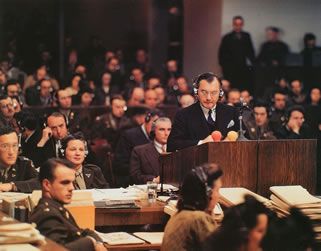
Consideration of a “Pooled Jurisdiction” Tribunal for Syria
The Open Society Justice Initiative (OSJI) has initiated a discussion with Syrian civil society groups about the creation of a Nuremberg-like tribunal for the prosecution of Syrian war criminals. While SJAC is generally supportive of all efforts that could bring a measure of justice and accountability for the atrocities committed in Syria since 2011, there are significant practical and legal obstacles to creating such a tribunal.
What is a pooled jurisdiction tribunal?
A pooled jurisdiction tribunal could be created by an international agreement by two or more states with an interest in seeing Syrian war crimes prosecuted by delegating already existing authorities to a new entity. States currently pursuing criminal cases through universal jurisdiction include Germany, the Netherlands, Sweden, and other European states. It is suggested that a pooled jurisdiction tribunal would be more efficient, lessen burdens on domestic states, and benefit from the involvement of specialists in international criminal law.
The Nuremberg tribunal was created by the victors of World War II in the absence of a functioning German state to prosecute the Nazi leadership. It was created by an international agreement but was criticized for prosecuting crimes predating its creation (ex post facto or principle of legality). It is said to be an example of a pooled jurisdiction tribunal.
Serious Concerns
Special war crimes units have been created in a number of states to investigate war crimes, generally where the perpetrator is residing within their country. The number of cases pursued by these units has steadily increased over the last decade with more recognition that there must not be impunity for serious crimes, even where they are committed abroad such as in Syria. These units have also become more specialized and developed expertise in the situations they are investigating.
In light of this development, it is not clear there would be resources available from these same states to contribute to a pooled jurisdiction tribunal. There is a real risk that funds that could support already existing structures would be siphoned off to support the newly created entity. Further, it would take considerable time and expense to negotiate the legal instruments (statute, rules of procedure, and evidence) that would be necessary for the creation and functioning of a pooled jurisdiction tribunal. From experience, this can take from 1-2 years.
Even after it is established, such a tribunal likely would not have any more powers than existing institutions to prosecute Syrian war criminals. Functional and personal immunities generally prevent the prosecution of senior government officials in a foreign country (See ICJ Arrest Warrant case). Even if a pooled jurisdiction tribunal were not bound by these immunities –an issue that would certainly be litigated – there is no reasonable prospect that Bashar Al Assad, or other senior Syrian officials, would be brought before such a tribunal for prosecution. The simple reality is that there is no physical mechanism to obtain custody over such persons through extradition proceedings unless and until there is a political change in Syria.
The interplay of such a tribunal with the International Independent and Impartial Mechanism (IIIM) is also not clear. The IIIM was created to lay the groundwork for future prosecutions by consolidating evidence of Syrian violations into a “central repository”. It does not have jurisdiction to prosecute. Would a pooled jurisdiction tribunal create further redundancy or would the IIIM be rendered obsolete? Syrian groups have worked hard to advocate for the creation and full funding of the IIIM. It would be a shame to throw it away at this juncture in favor of an unproven idea.
Finally, the proposal to create a pooled jurisdiction tribunal arises out of a discussion of the Syrian government’s failure to accede to a request by the Organisation for the Prohibition of Chemical Weapons (OPCW). The Syrian government’s use of chemical weapons against its people is an extremely serious violation that requires investigation and accountability. Indeed, the OPCW Investigation and Identification Team (IIT) is tasked with assigning responsibility for chemical weapons attacks in Syria. Though it too lacks jurisdiction to prosecute. If a pooled jurisdiction tribunal is created out of this process, there is a significant risk that its jurisdiction could be limited to the facts at issue before the OPCW, namely the use of chemical weapons. Whereas any tribunal created to prosecute crimes in Syria must be comprehensive and look at the entire landscape of violations committed during the conflict.
Conclusion
There remain serious gaps in accountability for crimes committed during the Syrian conflict. Foremost among these are violations committed by the Syrian government and the civilian and military leaders ordering those violations. Eventual prosecution at an international tribunal, such as the ICC, or a hybrid Syrian tribunal post-conflict, would be the most appropriate venue to hold such individuals accountable. Until such a time as that becomes politically feasible, we should support the work of special war crimes units (including with available resources) which continue to be the most practical way of obtaining a measure of justice for Syrian victims in the near term. Any discussion of a pooled-jurisdiction tribunal should take the above factors into consideration. The hopes and expectations of Syrian victims and survivors should not be raised for an academic exercise.
For more information or to provide feedback, please contact SJAC at [email protected] and follow us on Facebook and Twitter.